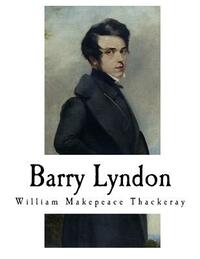Take a photo of a barcode or cover
The inspiration for Stanley Kubrick's brilliant motion picture, William Makepeace Thackeray's novel can be a bit tedious at times. Really, only the first third and the last third of the novel really serve as a basis for Kubrick's film. There are plenty of differences from the film, and in all of the cases, the film is superior. Most notable is the quite different ending. Still, I think any fan of the film should take the time and read this book. It's difficult, as Thackeray writes with the old world style we are not used to today. His writing is filled with a satire of the times, though, which make him stand out among other authors.
Kubrick really did pick up this novel and say, “the last 20% is pure drama, let’s make a long-ass movie about it!” (in this case film > book)
adventurous
dark
funny
slow-paced
Plot or Character Driven:
Character
Strong character development:
No
Loveable characters:
Complicated
Diverse cast of characters:
No
I'm not remembering having read an unreliable narrator novel written before this one, or at least it hasn't stuck in the memory enough for me to be able remember, but I liked experiencing an earlier version of the technique.
Either way, the way Thackeray begins with a rags-to-riches, oh-look-at-the-derring-do-of-that-loveable-rapscallion and slowly unravels and shows the man for what he is really worked for me. Maybe his awful nature is obvious from the start for the more observant reader - I guess I'm just another rube Redmond Barry fooled at first meeting.
Either way, the way Thackeray begins with a rags-to-riches, oh-look-at-the-derring-do-of-that-loveable-rapscallion and slowly unravels and shows the man for what he is really worked for me. Maybe his awful nature is obvious from the start for the more observant reader - I guess I'm just another rube Redmond Barry fooled at first meeting.
A tour-de-force of the unreliable narrator:
The first-person author's periodic footnotes help to editorialize his own contradictions, e.g.,
"we received but a cold welcome in his house—a miserable old tumble-down place it was. [Footnote: In another part of his memoir Mr. Barry will be found to describe this mansion as one of the most splendid palaces in Europe; but this is a practice not unusual with his nation; and with respect to the Irish principality claimed by him, it is known that Mr. Barry’s grandfather was an attorney and maker of his own fortune.]"
A classic line:
"Often and often has she talked to me and the neighbours regarding her own humility and piety, pointing them out in such a way that I would defy the most obstinate to disbelieve her."
The first-person author's periodic footnotes help to editorialize his own contradictions, e.g.,
"we received but a cold welcome in his house—a miserable old tumble-down place it was. [Footnote: In another part of his memoir Mr. Barry will be found to describe this mansion as one of the most splendid palaces in Europe; but this is a practice not unusual with his nation; and with respect to the Irish principality claimed by him, it is known that Mr. Barry’s grandfather was an attorney and maker of his own fortune.]"
A classic line:
"Often and often has she talked to me and the neighbours regarding her own humility and piety, pointing them out in such a way that I would defy the most obstinate to disbelieve her."
adventurous
dark
sad
tense
medium-paced
Plot or Character Driven:
A mix
Strong character development:
No
Loveable characters:
No
Diverse cast of characters:
No
Flaws of characters a main focus:
Yes
Non conoscevo questo autore classico, ed è quindi la prima volta che lo leggo. E non sarà l'ultima.
La storia è avvincente anche se un po' lenta, il protagonista accattivante anche se un po' controverso, la prosa frizzante nonostante sia narrata in prima persona.
Mi piace anche l'indulgenza dell'autore nei confronti del suo (anti)eroe.
La versione audio poi, letta da Massimo Popolizio per RadioRai, è narrata con la grinta appropriata al personaggio, giusti ritmi e intonazioni. Perfetta.
La storia è avvincente anche se un po' lenta, il protagonista accattivante anche se un po' controverso, la prosa frizzante nonostante sia narrata in prima persona.
Mi piace anche l'indulgenza dell'autore nei confronti del suo (anti)eroe.
La versione audio poi, letta da Massimo Popolizio per RadioRai, è narrata con la grinta appropriata al personaggio, giusti ritmi e intonazioni. Perfetta.
Solid, though not exactly A-list Thackeray. It's very apparent that this is an early book - the sharp satirical eye and sardonic humor of the later novels in abundantly in evidence, but there's a near-complete lack of the memorable, sharply defined characters that people his later work. Definitely picks up after Barry returns to England. The Prussian-mercenary stuff was - for me - fairly uninvolving, repetitious, and dull. Once Barry returns to England to pursue his fortune, and the utter wretchedness of his character is finally given free reign, things get more interesting. Well worth a read, but this is not something I'd recommend to a reader new to Thackeray.
Eh, glad it's finished now. I can watch the movie. I'll be interested to see what Kubrick did with the source material.
The books itself has its moments. Barry is a real SOB and unreliable narrator which gave the book an interesting angle. But it just didn't capture me enough. I will, however, still plan on reading Vanity Fair.
The books itself has its moments. Barry is a real SOB and unreliable narrator which gave the book an interesting angle. But it just didn't capture me enough. I will, however, still plan on reading Vanity Fair.
Put Barry Lyndon in chains, I say ! The rogue is a mysogynist cad. One of the most unlikable protagonists in literature. I am a huge fan of Thackeray's "Vanity Fair" but this is not an amusing romp through English society. Instead Barry Lyndon is an Irishman who drinks too much, is violent, crass, selfish, and dishonorable. He is an abusive father and husband.
The book is written in the 1st person, from Barry's perspective, and it doesn't take long into the book for one to realize that he isn't going to a gallant gentleman. From that discovery onward, his tales of misdeeds are tedious and offer more detail than is desired.
I made it through the book but I was so happy when it ended.
The book is written in the 1st person, from Barry's perspective, and it doesn't take long into the book for one to realize that he isn't going to a gallant gentleman. From that discovery onward, his tales of misdeeds are tedious and offer more detail than is desired.
I made it through the book but I was so happy when it ended.






